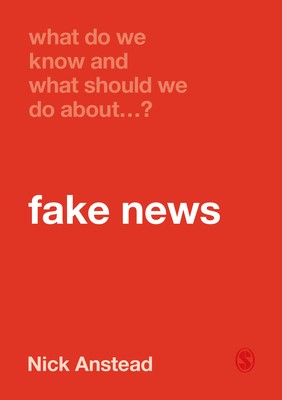
- We will send in 10–14 business days.
- Author: Nick Anstead
- Publisher: SAGE Publications Ltd
- ISBN-10: 1529717884
- ISBN-13: 9781529717884
- Format: 14.8 x 21 x 0.6 cm, softcover
- Language: English
- SAVE -10% with code: EXTRA
What Do We Know and What Should We Do about Fake News? (e-book) (used book) | bookbook.eu
Reviews
Description
Voters need to be informed to make political decisions, but what if their media diet not only prevents them from getting the information they need, but actively shapes inaccurate perceptions of the world?
Drawing on examples and evidence from around the world, this book aims to make a timely intervention to the debate about the concept of fake news. Its underlying argument will have three objectives. First, to offer more precise definitions for a term that is often loosely used. Second, to offer a less technologically determinist view of fake news. New social media platforms, such as Facebook and WhatsApp, are clearly an important part of the story, but they exist in wider social, political and institutional settings. Third, to situate the idea of fake news (and our concern about it) in broader arguments about an ongoing crisis and loss of confidence in liberal democratic institutions. Only with this perspective, it will be argued, can we possibly address the question of what we should do about fake news.
EXTRA 10 % discount with code: EXTRA
The promotion ends in 20d.16:20:34
The discount code is valid when purchasing from 10 €. Discounts do not stack.
- Author: Nick Anstead
- Publisher: SAGE Publications Ltd
- ISBN-10: 1529717884
- ISBN-13: 9781529717884
- Format: 14.8 x 21 x 0.6 cm, softcover
- Language: English English
Voters need to be informed to make political decisions, but what if their media diet not only prevents them from getting the information they need, but actively shapes inaccurate perceptions of the world?
Drawing on examples and evidence from around the world, this book aims to make a timely intervention to the debate about the concept of fake news. Its underlying argument will have three objectives. First, to offer more precise definitions for a term that is often loosely used. Second, to offer a less technologically determinist view of fake news. New social media platforms, such as Facebook and WhatsApp, are clearly an important part of the story, but they exist in wider social, political and institutional settings. Third, to situate the idea of fake news (and our concern about it) in broader arguments about an ongoing crisis and loss of confidence in liberal democratic institutions. Only with this perspective, it will be argued, can we possibly address the question of what we should do about fake news.


Reviews